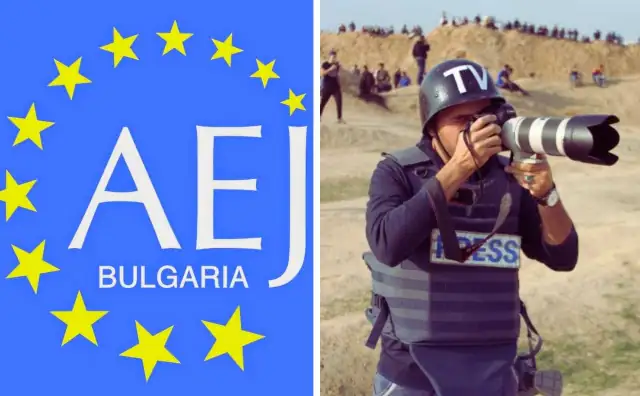
SOFIA – May 30, 2025 – The Association of European Journalists (AEJ) Bulgaria has called on the Israeli government to allow independent media access to parts of the Gaza Strip currently under Israeli army control.
The appeal follows a series of reports by Bulgarian journalists who recently visited Israel on a trip organized by the Israeli Foreign Ministry. While welcoming the opportunity to report from the field, AEJ stressed that accurate and fair coverage requires access to both sides of the conflict.
Since the start of the war in Gaza on October 7, 2023, when Hamas launched a surprise attack on Israel, foreign journalists have been barred from entering Gaza except when embedded with the Israeli military.
Over 70 global media outlets and journalist organizations have urged Israel to lift this restriction since 2024, but the ban remains in place.
In a strongly worded statement, AEJ Bulgaria noted that over 200 journalists and media workers—Palestinian and international—have been killed in Israeli airstrikes, marking an unprecedented loss of press lives in any modern conflict.
Among the latest victims was Helmi Al-Faqawi, head of the social media department at Palestine Today, killed on April 7, 2025, in a missile strike on a tent used by journalists outside Nasser Hospital in Khan Yunis.
His colleague, Ahmad Mansour, succumbed to burns the next day. Seven other journalists were injured in the same attack.
International watchdogs such as the Committee to Protect Journalists (CPJ) and Reporters Without Borders (RSF) have documented cases suggesting that journalists were deliberately targeted by Israeli forces.
These incidents, occurring in an environment of impunity and a lack of independent investigations, have prompted 60 journalist organizations—including AEJ Bulgaria—to call on the European Union to reassess its relationship with Israel. So far, the EU has not taken concrete action.
AEJ Bulgaria emphasized the vital role journalists play in ensuring truth and accountability during wartime. “If Israel invites Bulgarian journalists to report from its territory, it must also guarantee them access to occupied areas in Gaza and ensure their safety from Israeli fire,” the organization stated.
The situation on the ground continues to deteriorate, with humanitarian access blocked for over two months and rising civilian casualties. Medical professionals and humanitarian workers, among the few remaining credible sources inside Gaza, also face serious risks.
On March 19, Bulgarian UN worker Marin Marinov was killed by an Israeli tank shell—a strike acknowledged by the Israeli army only after media outlets, including The Washington Post, presented undeniable evidence. Another Bulgarian, anesthesiologist Milena Angelova-Chee, remains at Nasser Hospital despite surviving a previous bombing.
AEJ Bulgaria has called on Bulgarian newsrooms to join the global campaign for press freedom and safe access in Gaza. It also urged increased investment in war journalism, including funding for independent field reporting, protective gear, conflict zone training, and open-source intelligence (OSINT) verification teams.
“In times of war, journalists are the last line of defense against propaganda,” AEJ concluded. “Free and safe access to both Israel and Gaza is essential for telling the full story and giving voice to those caught in the crossfire.”
